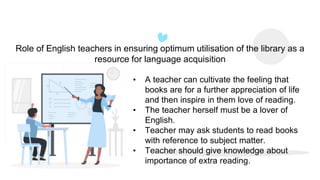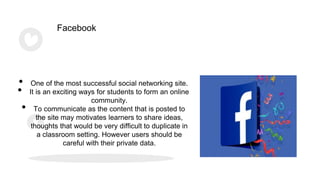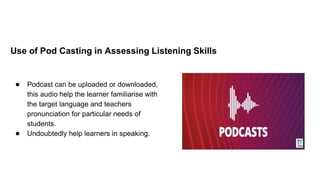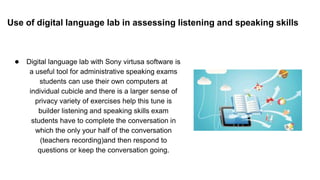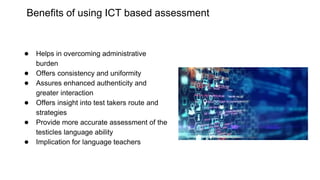Learning resources and assessment in Language
- 1. Unit 6: Learning Resources & Assessment in Language Presented by: Khan Sadika Roll No: 16
- 2. Library A place in which reading materials, such as books, periodicals, & newspapers, & often other materials such as musical & video recordings, are kept for use or lending. • Libraries often provide quiet areas for studying. • Modern libraries are increasingly being redefined as places to get unrestricted access to information in many formats and from many sources.
- 3. How the English teacher can use library for developing students language 1. Vocabulary Development 2. Listening and Speaking 3. Reading Fluency, including oral reading skills 4. Reading Comprehension Strategies 5. Writing Strategies
- 4. Role of English teachers in ensuring optimum utilisation of the library as a resource for language acquisition • A teacher can cultivate the feeling that books are for a further appreciation of life and then inspire in them love of reading. • The teacher herself must be a lover of English. • Teacher may ask students to read books with reference to subject matter. • Teacher should give knowledge about importance of extra reading.
- 5. E- Books ● An electronic format. It can easily be downloaded to a computer, PC, Mac, laptop, PDA, tablet, smartphone or any other kind of reading device & is read on the screen. ● It can have numbered pages, table of contents, pictures, graphics, exactly like a printed book.
- 6. YouTube • A well known popular video sharing platform. • A quick search on YouTube will reveal a number of ESL(English Subject Language) related video’s by teachers & students. • Students can learn various skills like listening and speaking skills, reading fluency, language comprehension, vocabulary and many more. • Students should be encourage to upload their own videos before recording the video.
- 7. Facebook • One of the most successful social networking site. • It is an exciting ways for students to form an online community. • To communicate as the content that is posted to the site may motivates learners to share ideas, thoughts that would be very difficult to duplicate in a classroom setting. However users should be careful with their private data.
- 8. Podcast • A podcast is an episodic series of spoken word digital audio files that a user can download to a personal device for easy listening. • A podcast series usually features one or more recurring hosts engaged in a discussion about a particular topic or current event.
- 9. Social Networking ● The use of social media in education provides students with the ability to get more useful information, to connect with learning groups and other educational systems that make education convenient. ● Social network tools afford students and institutions with multiple opportunities to improve learning methods, and also improves their communication, reading and comprehension skills.
- 10. CALL or Computer Assisted Language Learning may be defined as the search for and study of applications of the computer in language teaching and learning. • Roles of Computer in language learning and teaching. 1. Computer as tutor for language drill or skill practice. 2. Computer as a tool for writing, presenting and researching. 3. Computer as a medium for global communication. CALL
- 11. Role of a Teacher in CALL Teaching with one computer in the class Self access learning Teaching in the computer network room Distance Learning 01 02 03 04
- 12. ● Interest and Motivation ● Individualisation ● Compatible Learning Style ● Optimal Use of Learning Time ● Immediate Feedback ● Error Analysing ● Guided & Repetitive Practice ● Less Handy Equipment ● Increased Educational Costs ● Lack of Trained Teachers CALL Advantages Disadvantages
- 13. Computer as Tutor There are various ways ● Grammar ● Listening ● Pronunciation ● Reading ● Text Reconstruction ● Vocabulary ● Comprehension ● Programs ● Internet
- 14. ICT in Language Assessment The ever increasing explosion of highly attractive multimedia resources on offer has boosted the use of ICT in the teaching and learning of modern languages. The use of ICT to assess languages is less frequent, however, although on-line testing is starting to develop. Use of ICT in Assessment
- 15. Use of Pod Casting in Assessing Listening Skills ● Podcast can be uploaded or downloaded, this audio help the learner familiarise with the target language and teachers pronunciation for particular needs of students. ● Undoubtedly help learners in speaking.
- 16. Use of ICT in the assessment of reading ● Comprehension passages ● Web based quiz ● Online reading comprehension test ● Mind play reading evaluation ● Graded reading comprehension
- 17. Use of digital language lab in assessing listening and speaking skills ● Digital language lab with Sony virtusa software is a useful tool for administrative speaking exams students can use their own computers at individual cubicle and there is a larger sense of privacy variety of exercises help this tune is builder listening and speaking skills exam students have to complete the conversation in which the only your half of the conversation (teachers recording)and then respond to questions or keep the conversation going.
- 18. Tools for assessing objective items 1. Multiple choice question type 2. Text box 3. Fill in the blanks question type 4. Quizzes 5. Subjective test Use of ICT in assessing writing skills
- 19. 1. Question mark perception qmp 2. Electronic aise rater e-rater 3. Calibrand Marker 4. Automatic text maker (ATM) 5. Intelligence Essay Accessor (IEA) 6. eWrite 7. eMarking Assistant 8. Automated Analytic Rubrics 9. Markin 10.E-Portfolios Software used for assessing writing skills
- 20. ● Helps in overcoming administrative burden ● Offers consistency and uniformity ● Assures enhanced authenticity and greater interaction ● Offers insight into test takers route and strategies ● Provide more accurate assessment of the testicles language ability ● Implication for language teachers Benefits of using ICT based assessment
- 21. CREDITS: This presentation template was created by Slidesgo, including icons by Flaticon, infographics & images by Freepik and illustrations by Stories. Thank You !



